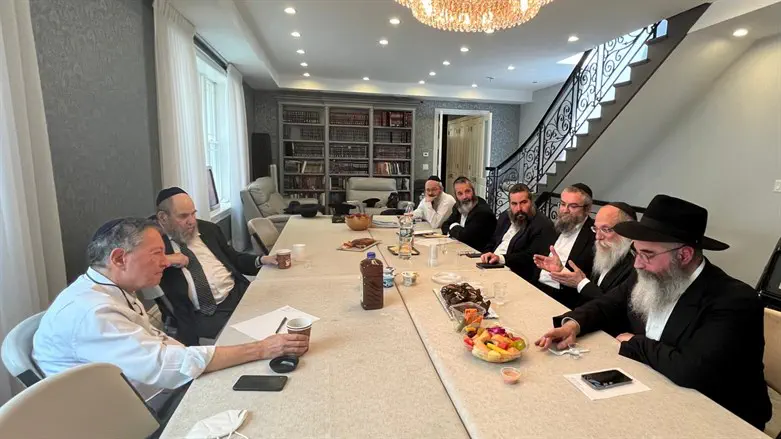
Two and a half months after the outbreak of the war in Ukraine, Ukrainian Jewry is recalculating its course.
Last night, a special meeting was held in New York, with the participation of representatives of community rabbis and Chabad emissaries in Ukraine, which dealt with long-term planning of a solution for the situation and the well-being of Ukrainian Jews.
The summit was attended by the host Rabbi Moshe Kotlarsky, vice chairman of Merkos L'inyonei Chinuch, one of the senior leaders of Chabad worldwide activities run by Chabad emissaries around the world, as well as the one who is leading the fundraising efforts in a variety of channels, philanthropist George Rohr, who is among the greatest supporters of Chabad communities, organizations and Chabad Houses in the Ukraine for the past 32 years, members of the Rabbinical Committee and Chabad emissaries in Ukraine - including the rabbi of Dnipro, Rabbi Shmuel Kaminetsky, who has been in the Ukrainian city since the outbreak of the war, rabbi of Odessa Rabbi Avraham Wolf, rabbi of western Ukraine Rabbi Shlomo Wilhelm of Zhitomir, rabbi of Kharkiv Rabbi Moshe Moskowitz and Rabbi Pinchas Vishetsky of Donetsk and Kyev.
At the summit, which lasted a full 24 hour stretch, there was a comprehensive and detailed overview of the rescue itself and the rescue activities of hundreds of thousands of Jews to safe havens, welfare and charitable activities with refugees from the war who are temporarily staying in several countries around the world, the continuation of the work of Chabad rabbis and emissaries with devotion as well as securing proper foundations for the future of the activities from nearby and from far.
The highlight of the meeting was the gradual reopening of the institutions and the careful return of the community rabbis and Chabad emissaries to their hometown.
Today, 155 rabbis serve in about 30 different communities in Ukrainian cities.
A number of them remained in the country under fire, since the onset of the war.
However, a large majority were forced to flee, due to the fierce attacks in their cities of residence.
Some of the communities suffered a severe blow following the war, and most of all by the community in the ruined city of Mariupol. And yet, in some cities, there are still many Jews, who were not allowed to cross the country's borders due to their age and their enlistment in the army, or adults who had trouble leaving physically.
Since the war began, most of the rabbis and many members of their congregations have been evacuated via special rescue operations.
Despite this, the rabbis continued to manage their communities remotely, supplying food and life-saving equipment for the Jews who stayed behind. It should be noted that in some places, such as in the cities of Dnipro, Odessa, Kherson and others, the rabbis remained at their place of residence.
The physical return of the rabbis of the communities and Chabad emissaries to the countries who left, as mentioned earlier, when the war became unbearable, will assist in reuniting communities that were torn apart, preserve what is left of them and redevelop the community institutions.
